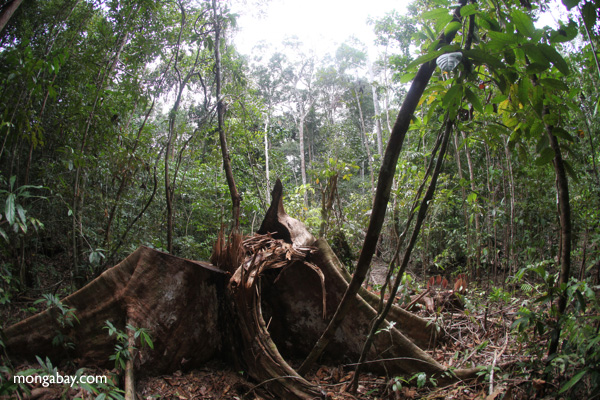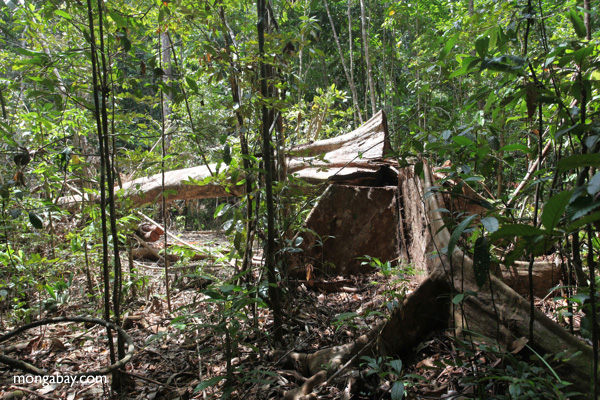 A stump is all that remains of an illegally felled tree in the rainforest of West Kalimantan, Indonesia. Recent findings indicate amendments made to the Lacey Act in 2008 may be stemming the tide of illegally sourced wood into the U.S. Photo by Rhett A. Butler.
A stump is all that remains of an illegally felled tree in the rainforest of West Kalimantan, Indonesia. Recent findings indicate amendments made to the Lacey Act in 2008 may be stemming the tide of illegally sourced wood into the U.S. Photo by Rhett A. Butler.
With forests razed around the world to feed the global timber market, some countries have clamped down on logging. However, this doesn’t always stem the tide. Indonesia, for example lost 840,000 hectares of primary forest in 2012 despite a ban on new palm oil concessions and logging; in Russia, old-growth forests are illegally felled to supply wood internationally. Some countries, such as the U.S., have imposed legislation at the consumer level, banning the import of illegally sourced wood through their borders. A new study finds that such legislation can be effective, with a 2008 amendment to the Lacey Act significantly reducing the influx of illegal wood into the U.S.
A celebrity hunter received a 30-day jail sentence and a year-long ban on hunting animals anywhere in the world for assisting turkey hunters in Tennessee, a violation of the terms of a plea agreement made when he pleaded guilty in 2007 to transporting an illegally hunted deer across state lines. In a different case, Gibson, the well-known guitar company, paid a fine of $300,000 for illegally importing Madagascar ebony into the United States. Both the hunter and the guitar vendor were prosecuted under the auspices of the same law – the Lacey Act – that prohibits trade in wildlife, fish and plants that have been illegally obtained, transported or sold.
The Lacey Act is the oldest U.S. wildlife protection statute, having been enacted in the year 1900. Iowan Congressman John Lacey introduced it to the House of Representatives to chiefly protect agriculture, preserve agriculturally beneficial birds, and eradicate harmful exotic species.

Illegally logged rainforest tree in Gunung Palung National Park, West Kalimantan. Photo by Rhett A. Butler.
Over the next 115 years, the Lacey Act has been changed and expanded several times. For instance, reptiles and amphibians received protection in 1969, and amendments were made in 2008 to prevent trade in plant or plant products obtained through illegal means.
But are the 2008 amendments really serving their intended function? Are imports of questionably-sourced plant materials declining? Jeff Prestemon, Research Forester and Project Leader at the United States Forestry Service’s Southern Research Station, decided to find out.
The True Costs of Illegal Logging
While government officials are hard pressed to measure the flow of illegally procured fiber into the U.S., the lack of available tools to trace the provenance and supply chains of imported hardwoods today makes tracking a difficult task.
“Whether there have been quantitative decreases in illegal timber in international trade is difficult to judge, since illegality, by its nature, is difficult to quantify in the timber area, as elsewhere,” Charles Barber told mongabay.com. The former Forest Division Chief for the U.S. State Department (2009-2014), Barber is now Senior Manager of the Forest Legality Alliance at World Resources Institute.
For example, illegally sourced timber could be routed through countries such as China, converted into furniture, and then resold to the U.S., making the original provenance of the wood extremely difficult to classify.
“Ironclad proof is harder to come by; if that was not so, there would presumably be many more Lacey Act prosecutions,” Barber said.
Thus, Prestemon was forced to devise other means to detect the impacts, if any, of the Lacey Act Amendments (LAA) of 2008.

A line of logs awaits processing at an illegal sawmill in Central Kalimantan. Photo by Rhett A. Butler.

Illegally logged lumber after processing. Photo taken in West Kalimantan by Rhett A. Butler.
The U.S. International Trade Commission provided Prestemon with data on monthly import quantities and monetary values for lumber products (beginning in 1989) and hardwood plywood (from 1996) from a variety of countries. To this, Prestemon added variables such as the Gross Domestic Product of the U.S. and its main trade partners, as well as housing and construction sector data, to come up with models that examined import levels and prices for hardwood both before and after 2008. He reported his findings late last year in the Journal of Forest Policy and Economics.
If the LAA did indeed serve as a barrier to the export of illegally sourced wood products to the U.S., we should expect to see the price of these products increase as overall supply decreases. And this is exactly what Prestemon did observe, to an extent he says that is both significant and remarkable.
He found that prices went up by 30 to 60 percent from 2008 to mid-2013, with the quantity of imported wood dropping as much as 70 percent over that same period.
Prestemon used Canada, the largest supplier of hardwood plywood and lumber to the U.S., as an effective comparison due to Canada’s excellent reputation for sustainably sourcing wood. By comparing imports from Canada – which has legal wood harvests that are relatively unaffected by the LAA – to those from tropical countries likely affected by the LAA, Prestemon was able to control for confounding variables that affected the market as a whole, such as the U.S. housing market crash.
The Future of the Hardwood Trade
According to Prestemon, Indonesia, Malaysia and Brazil are the primary countries affected by the LAA, since they top the list of suppliers that have historically exported questionably sourced wood products to the U.S. However, Prestemon says that the U.S. is not the world’s largest importer of hardwood plywood by far. That title goes to China and India, which do not have laws equivalent to the Lacey Act.

Indonesia is rife with commodity concessions, with much of its primary forests degraded for logging and cultivation of oil palm and wood fiber. According to Global Forest Watch, just over 21 percent of Kalimantan’s primary forests remain. Click to enlarge.
Recently, the European Union enacted the EU Timber Regulation (EUTR), which also bans the import of illegally sourced fiber, a law that derived support from the fact that the LAA was passed in the U.S., according to Barber.
In fact, the EUTR requires all imports to be certified as sustainably sourced, going beyond the LAA, where an importer would only need to provide such certification if the U.S. Government had reason to suspect the provenance of the product being imported.
“Volunteer partnerships with the EU and Australia put pressure on all exporters to do their due diligence in sustainably harvesting timber,” said Prestemon in an interview with mongabay.com. “All these countries working together can indirectly help to cut off the supply of illegal wood to the world’s market.”
Prestemon admits that further information is still required before the LAA can be branded as completely successful at reducing illegal fiber sourcing in all markets. Some producers could have diverted illegally sourced fiber exports away from countries like the U.S., toward countries without trade barriers. It is also possible that some timber-supplying countries that now export only legal fiber still use illegal fiber for domestic consumption.
“By taking away potential markets, one hopes that one is driving down the incentive to produce some of this wood,” Prestemon said.
Although direct impacts on deforestation rates have not been evaluated, Prestemon’s economic models offer a straightforward means to estimate the impact of legislation such as the Lacey Act. Plans to assess the impact of the LAA on other plant products, such as paper, are in the future, and Prestemon is currently working with European colleagues on models that assess the impact of the EUTR on plant product imports in the EU.
Citations:
Anderson, R. S. (1995). The Lacey Act: America’s premier weapon in the fight against unlawful wildlife trafficking (16 Pub. L. L.R. 27). Public Land Law Review
Margono, B. Primary forest cover loss in Indonesia over 2000–2012. Nature Climate Change,doi:10.1038/nclimate2277. Retrieved June 30, 2014, from Nature
Prestemon, J. P. (2015). The impacts of the Lacey Act Amendment of 2008 on US hardwood lumber and hardwood plywood imports. Forest Policy and Economics, 50, 31-44.
Wisch, R. F. (2003). Overview of the Lacey Act (16 U.S.C. SS 3371-3378). Animal Legal and Historical Center, Michigan State University College of Law.
}}